Sparrow Bones (Part IV)
A Girl's Life During the Great Chinese Famine
Disclaimer: This is a work of historical fiction. While the characters are made up, the events are based on records collected during this time. You can learn more about the history in the footnotes.
ICYMI:
Sparrow Bones Part I
Sparrow Bones Part II
Sparrow Bones Part III
Merry, merry Christmas everybody! Before we start, here are a few announcements.
If you’re new here, yay! Welcome 👏! I reply to all comments and emails, so feel free to reach out anytime.
This is the final installment of “Sparrow Bones”. I’ll be introducing a new story with a new cast of characters next week, so stay tuned for more. :)
Last week, I announced that I’ll be implementing a paid subscription plan starting in February. For those who’d like to show your support earlier, you can do so with the button below. Here’s the video announcement if you missed it.
Lastly, I’d REALLY appreciate it if you take a second to fill out the poll below. Substack doesn’t show how many people listen to the voiceovers (RIP), so I have zero clue if they’re actually useful or not. Your opinion would help this newsletter A LOT. If you have additional feedback regarding this aspect of the newsletter, feel free to leave a comment. Thanks!
And now, on with the show 🐦.
No time to read? Listen to it instead. :)
(Apologies for the smoke alarm beeps in this one).
The Girl looks up and sees the little wooden sparrow bobbing on the waters, its beak pointing toward the faint strip of red bloodying the horizon.
“Fly,” she whispers. “Fly home. You’re free now.”
It’s spring 2010. The Woman watches motes of dust twirl in the sunbeam cutting across her desk as she taps her pen against her notebook.
Outside her window, the first rays of dawn are beginning to peek over the crowns of a dozen slumbering high-rises. An engine coughs to life somewhere in the streets below followed by the sound of screeching tires.
She laces her fingers and rests her chin on the back of her hand, breathing in the promises of a new morning.
“You’re still working on that?”
She starts and whips around.
“I didn’t hear you come in,” she replies. “And yeah. I just finished an hour ago. It ends just before we meet Da Ming.”
“I still don’t see what good can come from reliving the past.” Her brother scrutinizes her with worried eyes. “That journalist probably has more than enough anecdotes to work with by now. Besides, are you even getting paid?”
The Woman shuffles past him towards the kitchen where a pot of red bean soup is gently bubbling on the stove.
“It’s not about getting paid,” she replies over her shoulders. “It’s about trying. I have a feeling the journalist would agree with me.”
He barks a laugh. “Of course, he’d say getting paid isn’t important.”
Her brother plucks a folded piece of paper off the coffee table.
“This the letter he sent you?” He catches her nod and then returns his attention to the letter. “‘—what good is knowing the truth if you dare not speak it in the face of deceit? Even the brightest candle, when hidden beneath a bowl, cannot be seen.’” He shakes his head but keeps reading. “‘Do not think your story is too insignificant for the world to care. A single grain is enough to tip the scales.’”
He tosses the letter back onto the table and sighs. “God, must also be a poet—the way he writes. What does he plan to do with these anecdotes1 anyway? You never mentioned.”
“Compile them into a book and hopefully publish them. I first heard about this project from…” The Woman’s voice trails off as she stirs the pot.
He scratches behind his ear—a tick she’d come to recognize as a sign that he’s craving a smoke. “Yeah?”
“Jin Yi was the one who put me in contact with the journalist. This was right before she…”
The Woman pauses to even her breathing. “Before she…you know. Have you read the next paragraph?”
Her brother scans the letter, the furrows between his brows deepening with each second.
“He’s right,” she says, setting down the spoon. “The journalist is right. Pretty soon there won’t be any of us left who can testify to what happened. All that’ll be left are government reports and old newspaper clippings. Statistics. Numbers on a sheet of paper.”
“I mean, what do you expect?” He yawns. “That’s all people like us are in the end. They don’t raise monuments for nobodies.”
“And maybe that’s a problem,” she counters. “When it’s the nobodies who end up bearing the consequences of the actions of the somebodies.”
Her brother scoffs, “Philosophy will rot your brain. Or worse, get it shot. Come back to the real world for once. You know, the one with grandchildren to raise, mahjong to play, groceries to haggle over.” He spits into the wastebasket and wipes his mouth on the back of his hand. “And leave all this…hard stuff to those who can actually do something about it.”
“You don’t understand because you were too young to have remembered anything.” The Woman wipes her hands on her pants just as the elevator rings in the hallway outside. “Unfortunately, I wasn’t so blessed.”
She locks eyes with him and a current of silent understanding passes between them. As her gaze sweeps over him, searching, she imagines the age melting off of him like wax to reveal the child underneath. Filmy eyes soften to a bright, earthy brown. Bushy eyebrows thin into a hazy line. Leathery skin fades into a buttermilk white.
Age may have hardened him on the outside, but it has not changed the way she still sees him—as the little boy she’d rock to sleep with a lullaby each night.
Little swallow, dressed beautifully,
Comes here every spring.
I asked her, "Why do you come here?"
She said, "The spring here is the most beautiful."
Little swallow, let me tell you—
This year is even more beautiful.
We've built large factories,
And equipped new machines.
Please live here forever!2
A knock at the front door jerks her from her reverie. She realizes that she’d been humming the song and quickly stops herself, hoping that her brother hadn’t heard her.
Remorse and longing pulse in her chest as she leaves the room, robbing him of the chance to ask the question that she knows has been haunting the back of his mind since she’d decided to answer the journalist’s letter: “Why would you rather tell the truth to the world than your own brother?”
As she approaches the door, a toddler’s shrill cry pierces the air. Someone is scolding him. Muffled chattering grows louder. The elevator dings again and footsteps echo in the hallway. Cries of greeting fill the air. The Woman laughs as she throws open the door and gestures for her children, all of them nearly a head taller than her, to come in, come in.
“Oh, and look at you!” She cries, allowing her youngest grandson to leap into her arms. “Four years old and already up to my hips. Soon, you’ll be looking down at Nai Nai like your parents.”
The little boy buries his face in The Woman’s collarbones and giggles shyly. “Happy birthday, Nai Nai.”
As they enter the living room, she catches sight of her brother standing alone on the balcony, cigarette smoke trailing from his mouth like a prayer.
A Cadre3 from the province’s capital had found her, her brother, and Jin Yi by the fields the morning after Grandpa Zhou’s demise, the three of them too weak and too bloated to move. Taking a handkerchief, he’d wiped the blood from their faces then slipped a small crystal of sugar into each of their mouths.
The Woman doesn’t remember the expression on his face as he carried them into the his vehicle. She doesn’t remember if she’d dreamed up two male voices whispering the words “120,000 dead in this county alone4…” or if that conversation had been real. She doesn’t remember how she ended up in between the covers of a feather down bed in the Cadre’s home.
But she can remember her brother’s eyes fluttering open as he sucked on the sugar. “Sparrow bones,” he’d gasped. She’d rolled the melting crystal around her mouth and croaked back, “That’s right. Sparrow bones.” It was the most deliriously sweet thing she’d ever put in her mouth, exactly like how she’d imagined the honey from her imaginary banquet hall would have tasted.
Funny how despite now having access to more food than she’d ever had as a child, the things she ate back then always tasted so much more flavorful than the things she ate now. Which reminded her…
“The restaurant owner said our table will be ready by eleven,” The Woman nodded at the clock. “I made some red bean soup in case anyone hasn’t eaten breakfast.”
Her grandson waves his arms in the air. “I haven’t! I haven’t!”
“That’s because you didn’t wake up on time,” his mother says, entering the room with a steaming bowl. “Ma, want me to bring you one?”
“No, I think I’ll get some air with your uncle.”
The Woman buckles her grandson into the high chair before heading for the balcony. She stops midway, hesitating for a few seconds then—before she can talk herself out of it—grabs the notebook from her desk.
The early morning wind stings her skin when she steps up beside her brother. He glances at her but doesn’t say anything, only drops the finished cigarette and crushes it underfoot.
“Remember the toy blocks we used to stack one on top of another?” She says, gesturing at the cityscape. “That’s what I think about whenever I see these buildings.”
Her brother tilts his head back and breathes deeply. The lines on his face relax as he remarks, “I still remember the first time Da Ming took us to the city—Shanghai, I believe—, and I saw roast duck hanging in the windows of restaurants, children scattering fistfuls of bread crumbs to birds, and my first skyscraper. At the time, I wondered if heaven was filled with skyscrapers. I couldn’t believe they weren’t the works of the divine.”
He laughs, but there’s a hollowness to it that suggests he’s going to reach for another cigarette soon.
Da Ming5 had been the Cadre who’d rescued them all those years ago. She’d later learned that he was part of a special investigation team headed by three of the country’s most powerful leaders to determine just how bad the famine had gotten in the countryside. Besides this one detail, he’d kept all other aspects of his work secret the entire time he raised them, from childhood through university.
The Woman never asked him why exactly he’d risked his career to save them—no one was allowed to leave their village without a permit at the time—but something buried deep in his eyes—guilt? revulsion? shame?—told her she wouldn’t get a straightforward answer even if she had asked.
“I have a feeling the divine has interceded in our lives in more ways than just showing us the city,” she replies, her fingers tracing the floral pattern emblazoned on the notebook cover.
She clears her throat and places the notebook on the railing beside him. “This is your story as much as it is mine, so…” She pauses, scouring her mind for the right words. “I think it’s only right that you read it before anyone else.”
He sticks another cigarette between his teeth but rather than lighting it, he lets it dangle there, insouciantly, like a half-formed thought.
After a moment, he locks eyes with her. “And what if I don’t want anyone else to read it?”
The Woman draws in a deep breath, pushing the notebook closer to him. “Then, it’ll be as you wish.”
The rest of the morning passed with all three of her grandchildren putting on a series of dance performances made up of a lot of shrieking and attempted pirouettes. Conversation oscillated between ogling at her eldest son-in-law’s sleek, new iphone and hushed whispers about her second daughter’s latest abortion. (“No, ma, it wasn’t as bad as last time…yes, I know, we’ll be more careful.6”) Plates of melon were passed around, walnuts cracked, and fizzy drinks popped open. Dramas with pretty music and even prettier actors hummed softly in the background. More than a few yawns floated through the air. The clock ticked.
And through it all, her brother remained on the balcony, his mouth constantly venting smoke. The Woman would glance anxiously at him every half hour or so and count the number of new cigarette butts that appeared around his feet. She gave up after realizing that he’d somehow caught onto her behavior and had started pushing them off the balcony edge with his shoe.
At one point, her youngest son asked, “What’s wrong with him, Ma? You guys arguing about something?”
She arranged her face into a reassuring expression. “Oh, you know, talking about the past. It puts him in a mood.”
He pressed on. “What was it this time?”
Realizing he’d persist until he dug out the truth, she removed her mask and sighed, “The Three Years of Natural Disasters7. A journalist reached out to me about it but your uncle’s skeptical, and well…we’ve been going back and forth on this for three weeks.”
His eyes widened with disbelief. “Three weeks? There’s really that much to talk about?”
The Woman shrugged and stabbed a chunk of melon with her toothpick. “For some people, yes.”
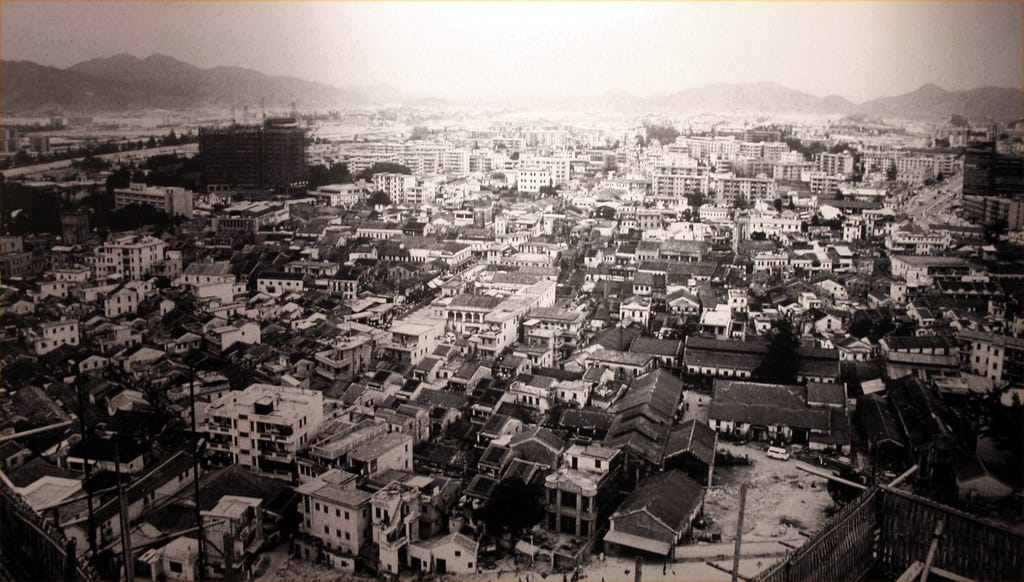
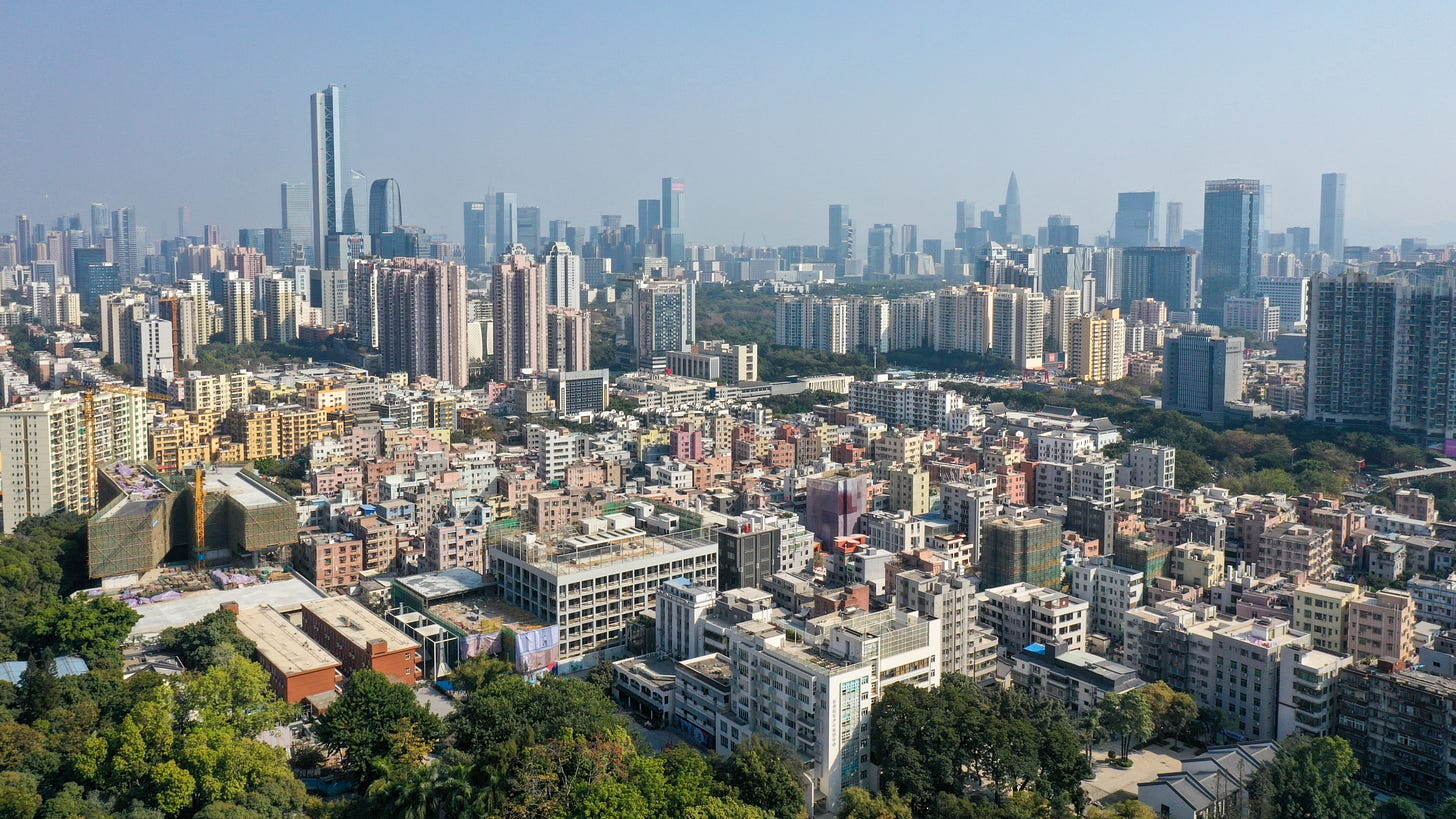
A warm breeze accompanies them as they meander from her apartment to the restaurant. The grandchildren ran ahead, stopping every ten feet or so to gawk at the various wares adorning the windowfronts of neighborhood shops: glossy candies from America, stacks of books with embossed covers, walls of mobile phones, jewels that glitter like starlight. A cacophony of rumbling engines, honking mopeds, and people shouting pounds her ears.
And everywhere—waste. A toddler drops a piece of bread but does not pick it up. A worker leaves a half-eaten box of takeout by a lamppost. Her own daughter flicks a piece of candied orange into a bin after deeming it too sour. The Woman grimaces as if she had been flicked herself.
At one point during their walk, the crowd grows so tight, that she feels as if she’s a piece of clay congealing with a hundred other pieces of clay into a shapeless mass. When she notices her brother fidgeting with another cigarette, she’s almost tempted to snatch it for herself.
She’d arrived in Shenzhen back in 1980, the same year that the government opened the city to the world as an economic experiment. Back then, the population had been a respectable 300,0008. Thirty years later in 2010, it rocketed to 10.2 million with a GDP of more than 58 billion USD9. Similar success stories are springing up all over the country: Guangzhou, Chongqing, Hefei, Chengdu, and dozens of others10.
The country is undergoing “an economic miracle” as Western and Chinese newspapers like to call it these days. A miracle that she had contributed to through twelve-hour work days in windowless factories for almost thirty years. A miracle that had helped her secure a better future for her progeny. A miracle that came too late for the tens of millions of people who had needlessly died only a few decades before11.
Inside the restaurant, her children order more dishes than a party twice their size can consume.
“Don’t worry, Ma,” her youngest son says, patting her arm. “We can always feed the stuff we don’t like to the dog.”
“But not the fried stuff,” his wife warns. “The children have been sneaking Tang Tang too much fried chicken lately.”
“Sure, not the fried stuff,” he agrees, returning his attention to the menu.
From the corner of her eyes, The Woman sees her brother pointing his chin at the door. She excuses herself and follows him into the carpeted hallway. They squeeze past several servers pushing carts laden with steaming platters before finally making it out to the street. Before she can ask where they’re going, he starts leading her toward an intersection she’s unfamiliar with.
“Is it as bad as you thought?” She asks, wiping her clammy palms on her pants. “You can tell me the truth. It won’t hurt me.”
His expression is inscrutable as he watches vehicles stream past them, but the stiffness of his gait tells her that he’s in deep thought.
A few minutes later, he replies, “When I was a child, I had this recurring dream of munching on a piece of meat, but the longer I chewed, the harder it became until it felt like I was chewing on teeth. But when I spit, what actually comes out are tiny bird skulls. One after another. Click. Click. Click.” He shakes his head. "It doesn’t stop until I wake up.
“I’d always thought Da Ming was some distant uncle who took pity on us after hearing about our situation,” he says. “You’d think so from the way he’d look at us with such guilt all the time.” After a pause, he adds, "How come the story doesn’t end with him rescuing us?”
The Woman musters a small smile. “He’s had such a shining career. I didn’t want to risk hurting his reputation.”
“Yes, showing compassion can do that to you,” he mutters drily.
“I’m sorry I never told you,” she says, trying to match his pace. “When you were younger, I didn’t want to scare you. What would you think of me and Jin Yi if you knew what we did? How can your jie jie (sister), this monster, look you in the eye again? Then, when you got older, I thought what’s the point of bringing up what everyone wants to forget? The past should stay in the past.
“But all that changed after I heard about the journalist’s project. It made me wonder if more good can come from revealing the truth than from hiding it. The more I thought about, the more I wanted to write, and so, the words just began to flow out of me, and I couldn’t stop. I wanted those two little girls and that little boy to live so badly. Don’t they deserve to live even if the world wants to forget them?”
They stop in front of a humble building with a green awning and the words “China Postal” on the door.
Her brother rolls a cigarette between his fingers then sticks it behind his ear with a sigh. “I won’t pretend to understand why it took you so long to reveal what happened. I won’t pretend that finally hearing the truth doesn’t scare me. It does. A part of me doesn’t want to believe it. And I don’t know how to make myself believe it at this age.”
He reaches inside his coat pocket and retrieves an envelope with the journalist’s address printed neatly on the front. The Woman’s eyes widen as she looks from the envelope to her brother.
“But I do know this: I don’t want those three kids to be forgotten either,” He says, pressing the envelope into her hands.
Realizing it isn’t sealed, she pulls out the folded content and scans the words scrawled across the top of the first page.
“Sparrow Bones,” she reads.
“You like it?” He chuckles. “I noticed you didn’t give it a title, so I took the liberty of adding one.”
She nods, tucking the paper away. “Thank you.” Then, hesitating, she adds, “Remember what you said about how they only raise monuments for the ‘somebodies?’”
He nods.
“Well,” she continues. “What if you’re right? What if no matter how loudly we shout, still, nobody cares? What change can one more story make in this already noisy, busy world?”
He smiles as he takes her hand, gently guiding her up the post office steps.
“You’re right. To those who don’t care, your story will mean nothing. But for those who do want to care but just need somebody to show them, your story could mean the difference between living in the light versus living in the dark. Who those people are, that’s not for us to decide. Our part is to send our story into the world. Theirs is to figure out what it means to them.”
The Woman looks at the hand wrapped around hers and begins to hum that song from this morning about the girl pleading with the little bird to stay with her forever.
Taking a deep breath, she says, “Then, let’s send it off together.”
“Together,” he agrees.
This idea from the story was inspired by a real-life project called Folk Memory Project. 108 interviewers visited 130 villages to record firsthand testimonies about the Great Chinese Famine. https://www.npr.org/2012/11/11/164801546/recording-the-untold-stories-of-chinas-great-famine
https://www.mamalisa.com/?t=es&p=1206
In 1960, three high-ranking officials began visiting villages to investigate the true death toll of the famine. Their findings led them to conclude that tens of millions had perished in the past two years. The Party president at the time, Liu Shaoqi, visited his home village in Hunan in 1961 and to his shock, discovered that many of his friends and family had also died of starvation. From then on, he began to both subtly and actively oppose Chairman Mao’s Great Leap Forward policies, leading to his eventual imprisonment and death in 1967. https://www.youtube.com/watch?v=AHR15JxckZg&t=2077s
In 1960, three high-ranking officials began visiting villages to investigate the death toll of the famine. Their findings led them to conclude that tens of millions had perished in the past two years. One former cadre remembers that the local officials would downplay the number of deaths when questioned. In one county, officials claimed 90,000 had died when the numbers was actually closer to 120,000. The party president at the time, Liu Saho qi, also visited his home village in 1961 and to his shock, discovered that though many of his family and friends had died, the local officials had deliberately prevented news of their death from reaching him. From then on, he began to subvert Chairman Mao’s Great Leap Forward policies, leading to his eventual imprisonment in 1967. https://www.youtube.com/watch?v=AHR15JxckZg&t=2077s
While the story of the three high-ranking officials investigating conditions in the countryside is true, this story about the cadre rescuing three children is made up and should not be conflated with reality.
Due to a steep uptick in population growth and a lack of resources to support this growth, China implemented the One-child policy in 1980, mandating that each family can only have one child. To enforce this policy, the government made contraceptives more widely available, financially penalized those who did not comply, and even at times forced abortions. The policy was amended to allow couples to have as many as three children in 2021 in the face of a declining national population. https://www.britannica.com/topic/one-child-policy#:~:text=The%20one%2Dchild%20policy%20was,viewed%20as%20being%20too%20rapid
The official term for the Great Chinese Famine in Chinese is “三年自然灾害”, aka “The Three Years of Natural Disasters”. The purpose of the term is to shift blame away from government policies and onto natural causes. https://www.theguardian.com/world/2013/jan/01/china-great-famine-book-tombstone
https://www.macrotrends.net/cities/20667/shenzhen/population
In 2008, Shenzhen’s GDP was $58 billion USD. In 2023, that figure is $334 billion, according to the Shenzhen municipal government. https://www.chinadaily.com.cn/china/2008-07/24/content_6873765.htm & http://www.sz.gov.cn/en_szgov/news/latest/content/post_10923479.html#:~:text=Shenzhen%27s%20economy%20posted%20a%20steady,the%20local%20statistics%20bureau%20yesterday.
https://a-z-animals.com/blog/the-fastest-growing-towns-in-china-everyone-is-talking-about/#:~:text=Modern%20Chinese%20luminaries%20like%20Beijing,relentless%20ambition%20for%20global%20prominence.
Poor record keeping and deliberate obfuscation of the horrors of the famine by government authorities have made the official death toll of the famine a battleground of scholarly debate. The general consensus, however, seems to rest somewhere between 15-55 million. To put that into perspective, the total number of WWII deaths is estimated to range from 35-60 million. https://en.wikipedia.org/wiki/Great_Chinese_Famine & https://www.britannica.com/question/How-many-people-died-during-World-War-II



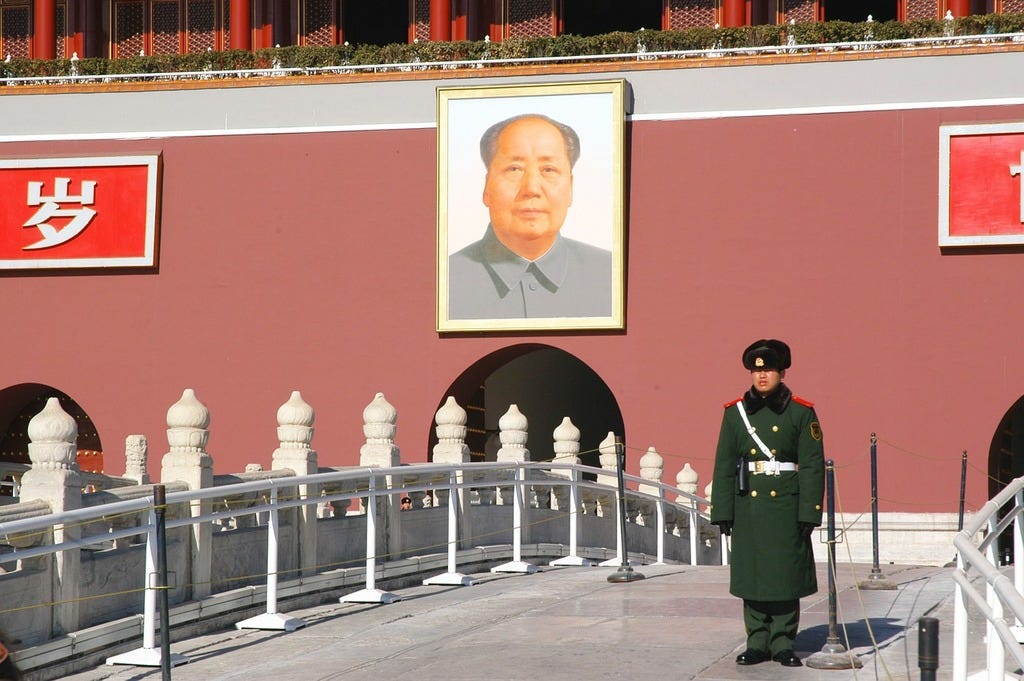
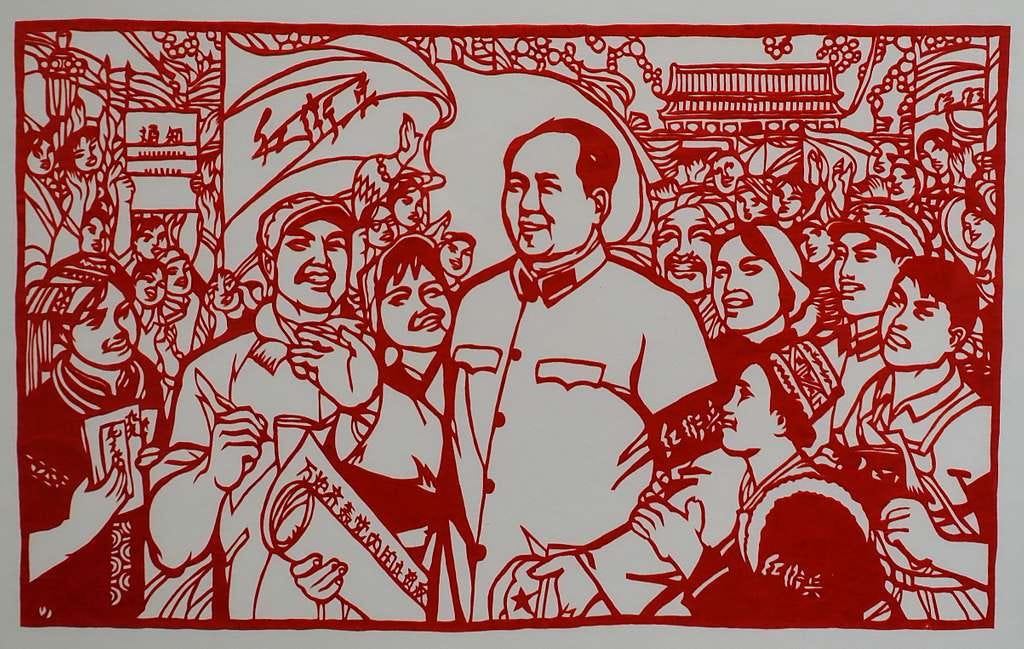
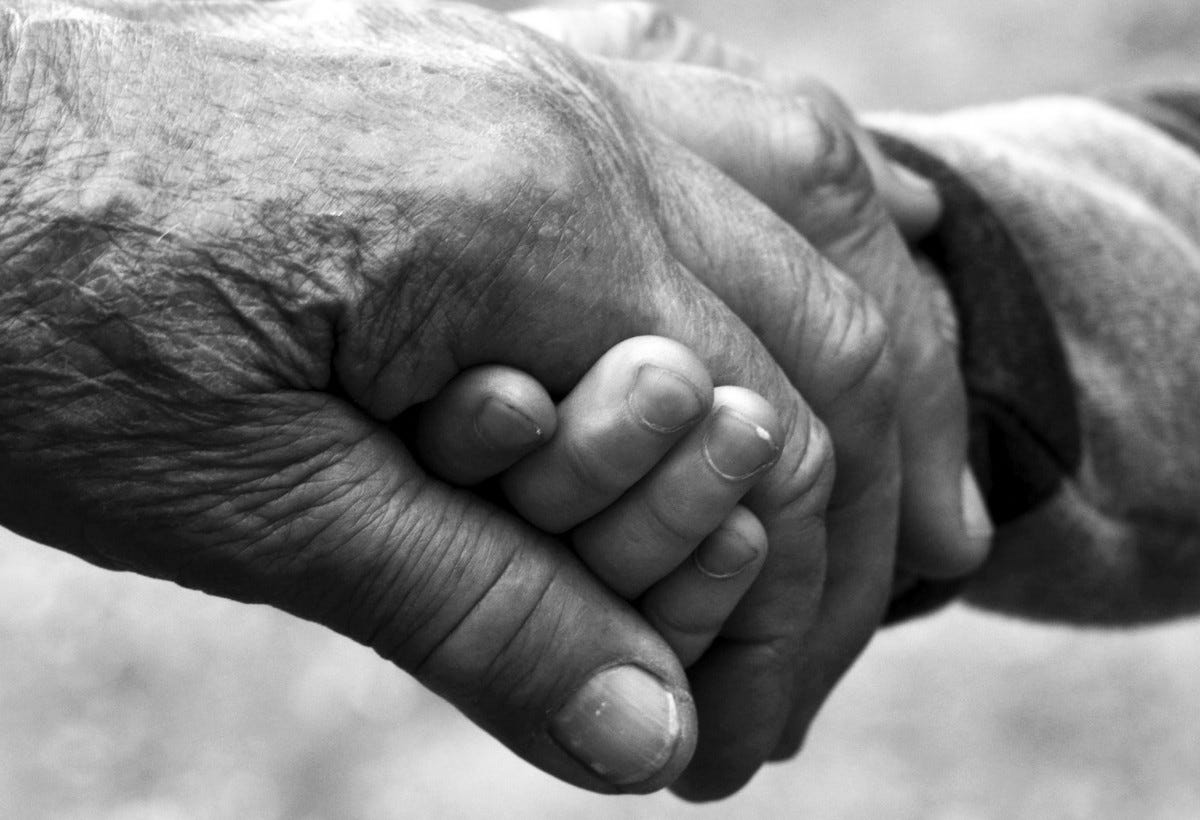
Please do continue to write. You have things to say that are worth hearing.
This one choked me up, Macy. It’s an important story. Thank you. Merry Christmas!